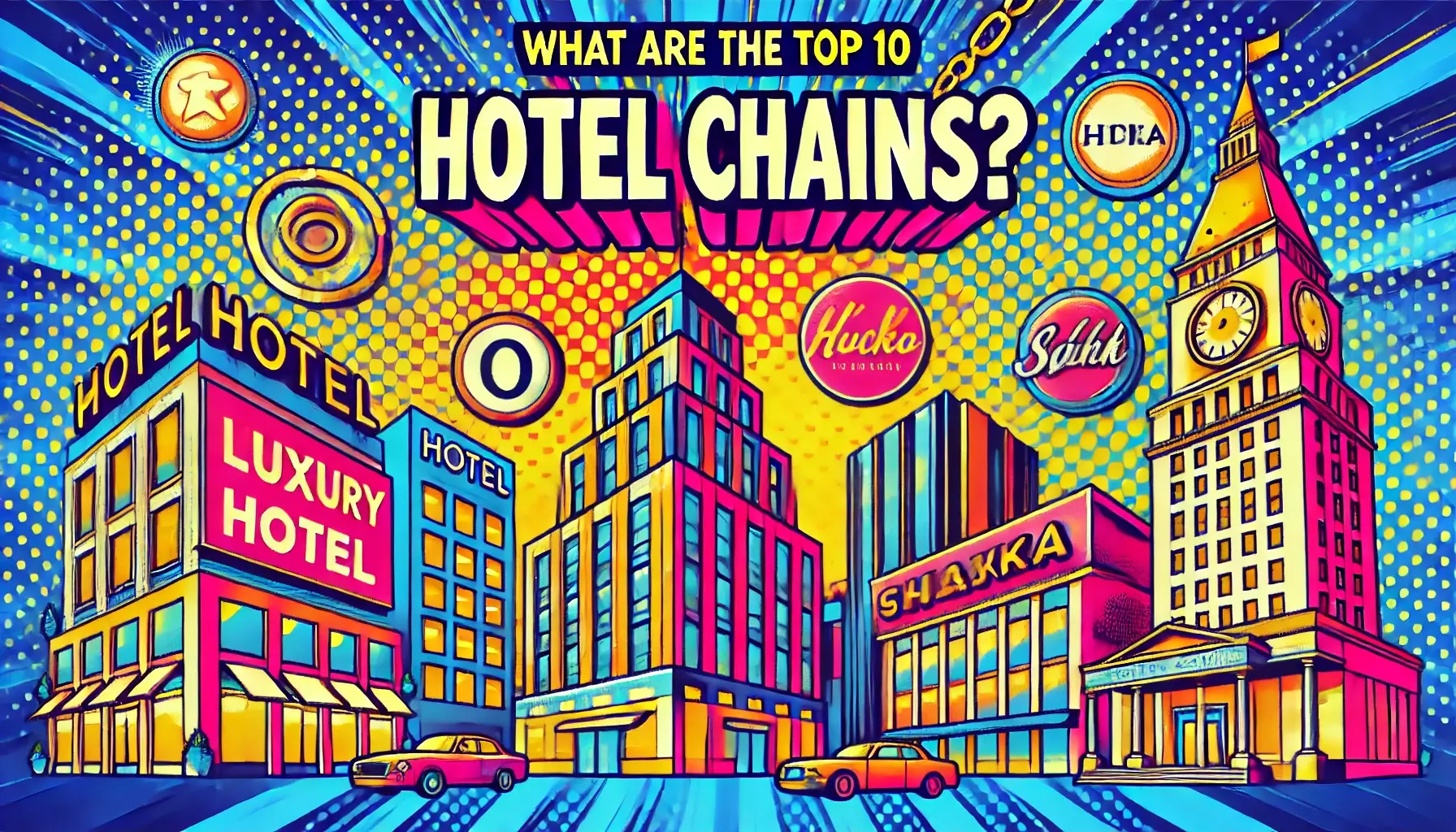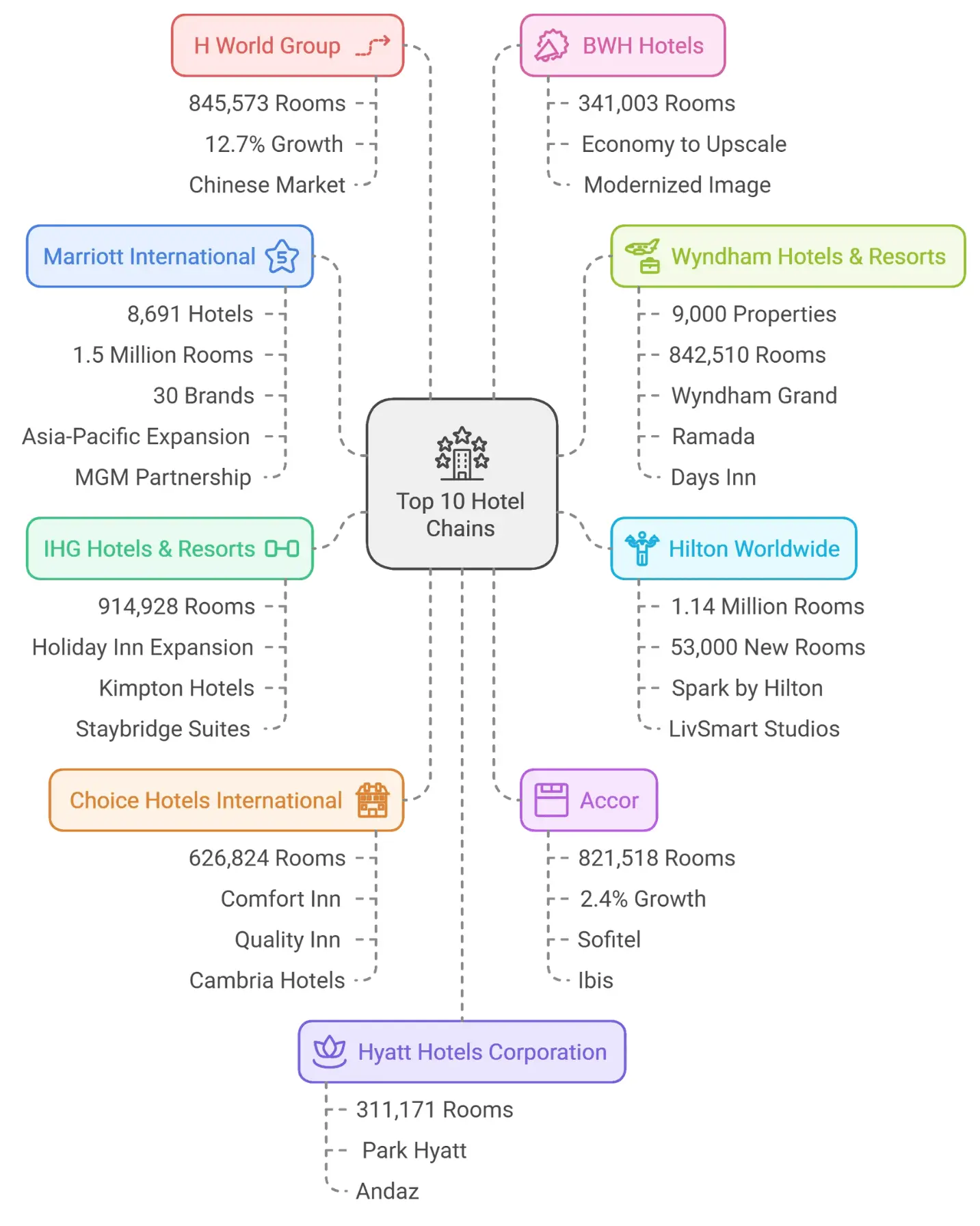1. Introduction
The global hotel industry is a massive and ever-evolving sector that plays a crucial role in both business and leisure travel. With millions of travelers seeking accommodations across various destinations, hotel chains provide a consistent and reliable experience, ensuring guests can expect quality and familiarity regardless of where they stay. In an increasingly interconnected world, these large hotel groups are more than just places to sleep—they are part of the travel experience, offering a wide range of amenities, from luxury services to budget-friendly options.

Hotel chains dominate the hospitality market, with their ability to scale and maintain consistent standards across multiple properties, countries, and regions. They provide stability, brand recognition, and loyalty programs that attract travelers worldwide. For frequent travelers, staying within a trusted chain can simplify the decision-making process, as they often know what to expect in terms of service, comfort, and amenities.

When determining the top hotel chains, several metrics come into play, such as the number of rooms, total properties, global presence, and portfolio growth. These factors not only reflect the size and reach of the hotel chains but also their ability to meet diverse customer needs and expand into new markets. The ability to adapt, innovate, and capture market share through strategic expansions, acquisitions, or partnerships often cements a hotel chain’s position at the top.
2. Top 10 Hotel Chains Overview
Based on the latest data, this ranking highlights the ten largest hotel chains in the world, offering insight into their global influence and growth trajectories. The rankings are primarily determined by the number of guestrooms, with additional consideration given to the total number of properties, the geographical scope of operations, and recent expansions.

The hotel chains on this list vary widely in terms of scale and market segments, from high-end luxury hotels to more budget-friendly and extended-stay accommodations. Several chains have maintained their leadership positions for years through aggressive expansion strategies, new brand launches, and mergers, while others have risen through rapid growth in key regions, particularly in the Asia-Pacific and Latin American markets. Growth percentages and key developments over the past year, such as brand expansions or strategic partnerships, also play a significant role in determining their ranks in the competitive hospitality landscape.
3. Detailed List of the Top 10 Hotel Chains

According to out research this is a Detailed List of the Top 10 Hotel Chains, discussed below:
3.1. Marriott International
Marriott International stands as the largest and most influential hotel chain in the world, continuing to lead the global hospitality industry. With a diverse portfolio of 30 brands, Marriott operates 8,691 hotels across 139 countries, offering over 1.5 million rooms. Marriott’s brand strength lies in its ability to cater to a broad spectrum of travelers, from luxury seekers with brands like The Ritz-Carlton and St. Regis to more budget-conscious customers through Courtyard and Fairfield Inn.
In recent years, Marriott has aggressively expanded its footprint, particularly in the Asia-Pacific and Latin American regions, where demand for new hotels continues to rise. Its strategic partnership with MGM Resorts International in 2024 added 37,000 rooms to its development pipeline, further solidifying its dominant position in the global market.
3.2. Hilton Worldwide

Hilton Worldwide holds a strong second place, with over 1.14 million rooms across its global portfolio. Known for its exceptional service and innovation, Hilton has expanded significantly, maintaining its reputation as a leader in the hospitality industry. The company’s strategic growth is reflected in the addition of more than 53,000 new rooms in recent years, with a focus on the upscale market.
Hilton has introduced two new brands, “Spark by Hilton” and “LivSmart Studios by Hilton”, catering to travelers seeking affordable yet upscale accommodations and long-term stays. This move reflects Hilton’s adaptability to current market trends, particularly in catering to extended-stay travelers and offering high-quality, economical options. The brand remains a popular choice for both leisure and business travelers worldwide.
3.3. IHG Hotels & Resorts
InterContinental Hotels Group (IHG) ranks third globally, with 914,928 rooms in its portfolio. IHG boasts a diverse selection of brands, including the upscale InterContinental and Kimpton Hotels, as well as mid-range and budget-friendly brands like Holiday Inn and Staybridge Suites.
A significant driver of IHG’s growth has been the rapid expansion of its “Holiday Inn” brand, which accounted for two-thirds of the company’s global openings in 2023. IHG is rapidly approaching the one-million-room milestone, reflecting its strong global presence and continued expansion in emerging markets. The company’s ability to cater to a wide range of travelers makes it one of the most versatile and respected players in the industry.
3.4. Wyndham Hotels & Resorts
Wyndham Hotels & Resorts is known for its vast global reach, offering over 9,000 properties worldwide. With 842,510 rooms, it ranks as the fourth-largest hotel chain by guest room count. Wyndham operates in nearly every segment of the hotel market, from upscale to budget-friendly accommodations, giving it a strong presence across different traveler demographics.
Wyndham’s appeal lies in its accessibility, offering brands such as Wyndham Grand, Ramada, and Days Inn. Its wide range of hotel offerings makes it a reliable choice for travelers looking for consistency in quality, whether they are seeking luxury or economical stays.
3.5. Choice Hotels International

Choice Hotels International secures the fifth spot with a portfolio of 626,824 rooms. Known for its diverse range of brands, including Comfort Inn, Quality Inn, and Cambria Hotels, Choice Hotels serves a wide variety of market segments, from budget-conscious travelers to those seeking midscale and upscale experiences.
The company’s strength lies in its ability to offer affordable, reliable accommodations across its different brands, appealing to both leisure and business travelers. With a focus on expansion in key regions, Choice Hotels has positioned itself as a leading player in the mid-market segment of the hotel industry.
3.6. H World Group (Huazhu Hotels Group)
H World Group, formerly known as Huazhu Hotels Group, has seen remarkable growth in recent years, cementing its position as one of the largest hotel chains globally. The group manages 8,866 hotels, offering a total of 845,573 rooms. In 2023, H World recorded an impressive 12.7% growth in its portfolio, surpassing Accor to claim the sixth position in the global ranking. The company’s rapid expansion is largely focused on the Chinese market, where it continues to dominate, while also making strategic moves to expand internationally.
3.7. Accor
Accor, a prominent French hotel group, ranks seventh globally with 821,518 rooms. Despite facing more moderate growth compared to its competitors (a 2.4% increase), Accor has posted excellent financial results, including a record EBITDA of over €1 billion. The group’s diverse portfolio, which includes luxury brands like Sofitel and Fairmont, as well as economy options such as Ibis, allows it to cater to a wide range of travelers. Accor remains a key player in the global hospitality market, driven by its focus on delivering memorable guest experiences across its properties.
3.8. BWH Hotels (Best Western)
BWH Hotels, previously known as Best Western Hotels & Resorts, has undergone significant rebranding efforts in recent years to modernize its image and appeal to a broader audience. The company manages 341,003 rooms across a global portfolio that includes several brands ranging from economy to upscale segments. The rebranding has helped BWH Hotels stay competitive, with a focus on enhancing customer experience while maintaining its position as one of the most recognized hotel chains worldwide.

3.9. Hyatt Hotels Corporation
Hyatt Hotels Corporation ranks ninth globally, with 311,171 rooms. Known for its focus on luxury and upscale accommodations, Hyatt’s portfolio includes renowned brands such as Park Hyatt, Andaz, and the Hyatt Regency. The company has a strong global presence, particularly in major cities and key tourist destinations, where it continues to grow its luxury offerings. Hyatt’s commitment to high-end experiences has made it a go-to choice for travelers seeking exceptional service and refined accommodations.
3.10. Jin Jiang International
Jin Jiang International stands out for having the highest number of hotel properties globally, with an impressive total of 11,959 locations. Despite this vast global footprint, the chain’s room count is not as large as its number of properties would suggest, distinguishing Jin Jiang from competitors that focus on larger hotels with higher room capacities. The company’s strength lies in its ability to manage numerous small-to-mid-sized properties, particularly in China, where it dominates the domestic hotel market.
4. Trends and Insights from the Top 10 Chains

Across the top 10 hotel chains, several key trends are shaping the future of the global hospitality industry:
Expansion in Asia-Pacific: Many of the leading hotel chains are aggressively expanding in the Asia-Pacific region, driven by rising demand from both domestic and international travelers. Marriott, Hilton, and IHG, in particular, are focusing on growing their presence in this rapidly developing market.
Economical and Extended-Stay Segments: There is a noticeable trend toward catering to budget-conscious travelers and those seeking extended-stay options. Brands like Hilton’s
“Spark by Hilton” and “LivSmart Studios” are leading the charge in providing affordable yet upscale accommodations for travelers who require longer stays. This trend is driven by changing travel behaviors, including remote work and longer vacations.
Sustainability and Technology: Hotel chains are increasingly embracing innovations such as digital check-ins, eco-friendly practices, and smart technology in rooms to improve customer experiences. Sustainability initiatives, such as reducing carbon footprints and enhancing energy efficiency, are becoming standard practices across the industry.
Post-Pandemic Adaptations: The COVID-19 pandemic reshaped the hotel industry, and chains are now adapting to new travel realities. These adaptations include enhanced cleanliness protocols, flexible cancellation policies, and more personalized services. Hotels are also investing in digital technologies to streamline guest experiences while maintaining safety standards.
Future Predictions: With growing demand in regions like Asia-Pacific and Latin America, hotel chains are expected to continue expanding in these areas. Additionally, the focus on sustainability and technology-driven services is likely to evolve, with hotels offering more immersive, personalized experiences through AI and data analytics.
5. Conclusion
The top 10 hotel chains—Marriott International, Hilton, IHG, Wyndham, Choice Hotels, H World Group, Accor, BWH Hotels, Hyatt, and Jin Jiang—dominate the global hospitality industry by offering a wide range of accommodations and expanding their footprints worldwide. Each chain brings unique strengths, from luxury offerings to budget-friendly options, catering to a diverse set of travelers.
As the industry continues to recover and adapt post-pandemic, trends like expansion into emerging markets, eco-friendly practices, and a focus on economical and extended-stay segments will define the future of these hotel giants. With sustainability and technological innovation at the forefront, the industry is poised for significant growth.
Have you stayed at any of these hotel chains? Share your experiences in the comments! Whether you’re a luxury traveler or looking for an economical stay, these chains offer something for everyone—find the one that suits your preferences and enjoy your next trip!
FAQ
1. What are the largest hotel chains in the world?
The largest hotel chains globally include Marriott International, Hilton Worldwide, IHG Hotels & Resorts, Wyndham Hotels & Resorts, and Choice Hotels. These brands are recognized for their extensive reach, offering everything from luxury accommodations to budget-friendly options.
2. Why are hotel chains so popular among travelers?
Hotel chains offer consistency in quality, amenities, and service, making them a popular choice for frequent travelers. Their loyalty programs and trusted brand standards provide guests with reliable accommodations, no matter where they are.
3. Which hotel chains have the most properties worldwide?
As of recent data, Jin Jiang International holds the most properties globally, followed closely by Wyndham Hotels & Resorts and Marriott International. These chains have a massive presence across multiple continents.
4. What trends are shaping the future of the hotel industry?
The hotel industry is increasingly focusing on sustainable practices, technology-driven services, and catering to both luxury and budget segments. Brands are expanding in the Asia-Pacific region and investing in eco-friendly amenities and digital innovations.
5. How have hotel chains adapted post-COVID-19?
Many hotel chains have implemented enhanced cleanliness protocols, flexible booking options, and contactless services to ensure guest safety. Some brands have also introduced extended-stay and budget-friendly options to cater to new travel demands.




Comment (0)